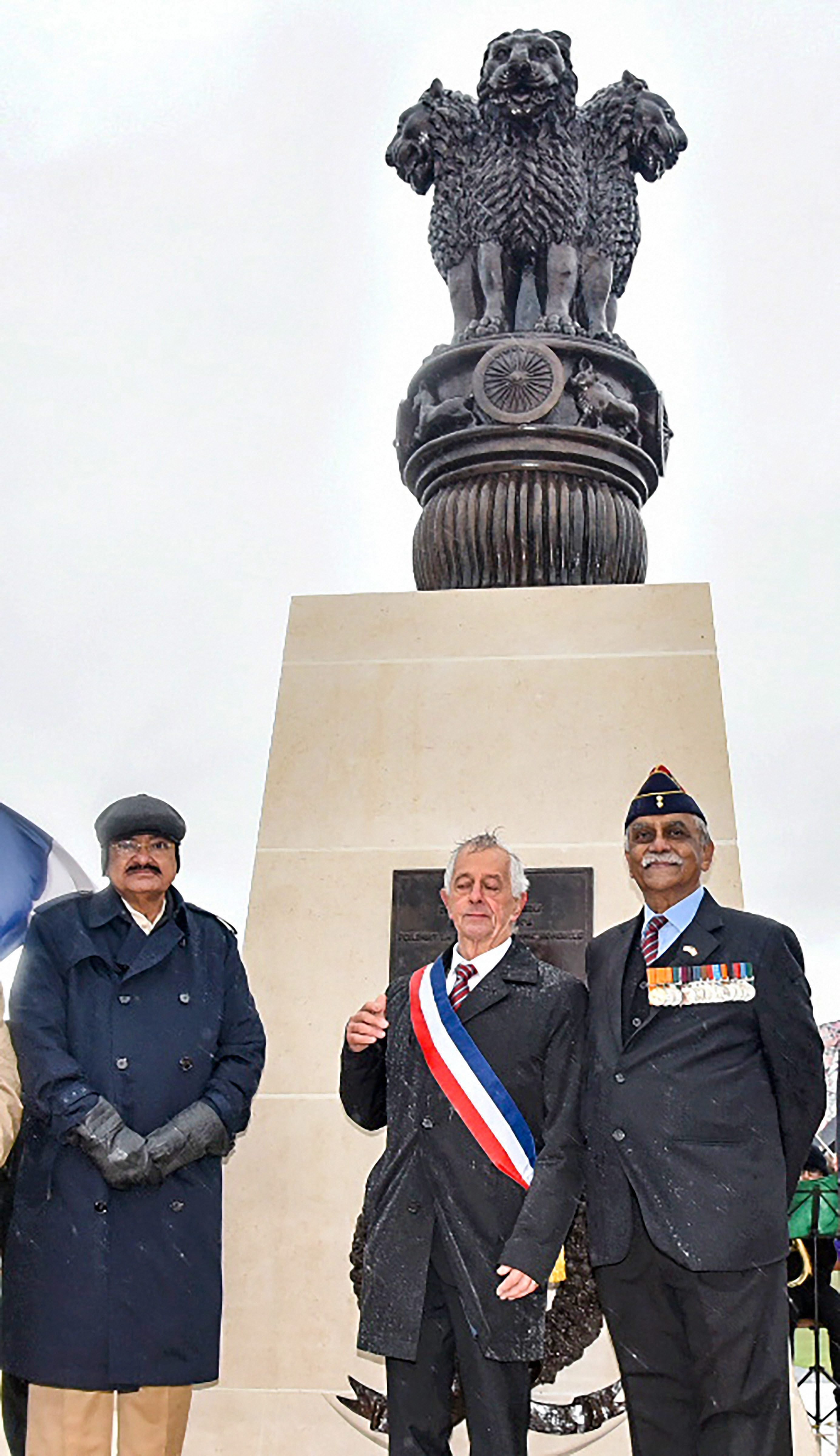A statue commemorating the role of Indian soldiers in World War I was unveiled in the town of Laventie in France to mark Armistice Day when the war ended in 1918.
The seven-foot bronze statue is the first of 57 similar commemorative sculptures planned by the Inter-Faith Shaheedi Commemoration Association (IFSC) to be unveiled near cemeteries around France where soldiers who fought for the British Indian Army were buried.
The site in Laventie was chosen after the remains of two soldiers were identified as belonging to the 39th Royal Garhwal Rifles and reburied with military honours last year.
'This marks the commencement of our project to establish 57 such statues near all cemeteries where our Indian soldiers lie buried in France,' said Col (retd) Deepak Dahiya, who served for 23 years in the Indian Army and is now based in Paris to facilitate the IFSC project as its vice-president.
The statue was unveiled at a spot allocated by the Mayor of Laventie, Jean-Philippe Boonaert, adjacent to a 12th century church, St Vaast, in the French town.
The unveiling on Sunday sets the ball rolling for a series of events planned by IFSC to honour the memory of thousands of Indian soldiers, who largely went undocumented as the forces sent from the subcontinent at the time tended to be British Empire soldiers or soldiers of Indian princely states.
'The First World War is a relatively unnoticed event in an otherwise historic timeline of Indian events. This colossal effort in the most difficult circumstance is not entirely forgotten nor actively remembered and needs to be portrayed in the correct perspective globally and in India,' said IFSC president Ramesh Chander Vohra, who has written a book on the subject titled Unsung Indian Heroes of World War I', which is set to be released next year alongside an exhibition of newspaper articles from the World War I period of 1914-1918.
IFSC has also commenced work to establish a 12-tonne brass statue adjacent to the Indian war memorial at Neuve Chapelle in Richebourg, France.
The memorial commemorates over 4,700 soldiers and labourers from British India who lost their lives on the Western Front during World War I and have no known graves. A spot has been allocated by the local French authorities for this large sculpture, which is also expected to be unveiled in 2019.
A series of commemorative events have been taking place across UK and Europe in recent weeks to mark the contribution of Indian soldiers in the war effort, alongside millions of others from around the world. This included a special event at Westminster Abbey in London earlier this week attended by Prince Harry, who witnessed a wreath of marigolds shaped in the symbol 'Om' laid in honour of Indian soldiers.
'The Duke of Sussex (Harry) was extremely gracious as he admired our marigold tribute at the 'Indian Army pre-1947 Memorial Plot' at the Abbey,' said Satya Minhas, co-chair of Hindu Council UK.
A special event organised by the South Asia Centre of the London School of Economics (LSE) celebrated the launch of the commemorative Khadi poppy to mark the centenary of the end of the war on November 11, 1918, or Armistice Day.
'The hand-woven fabric synonymous with India's independence movement is a highly appropriate gesture to recognise the outsized contribution of Indian soldiers,' said Lord Jitesh Gadhia, the Indian-origin peer behind the initiative alongside the Royal British Legion's annual Poppy Appeal fundraising drive in aid of war veterans held in the lead up to Armistice Day.
Nearly 2 million Indian servicemen, workers and labourers travelled west for World War I as they helped secure victory for the Allied Forces Britain, France, Russia, Italy and the US.











